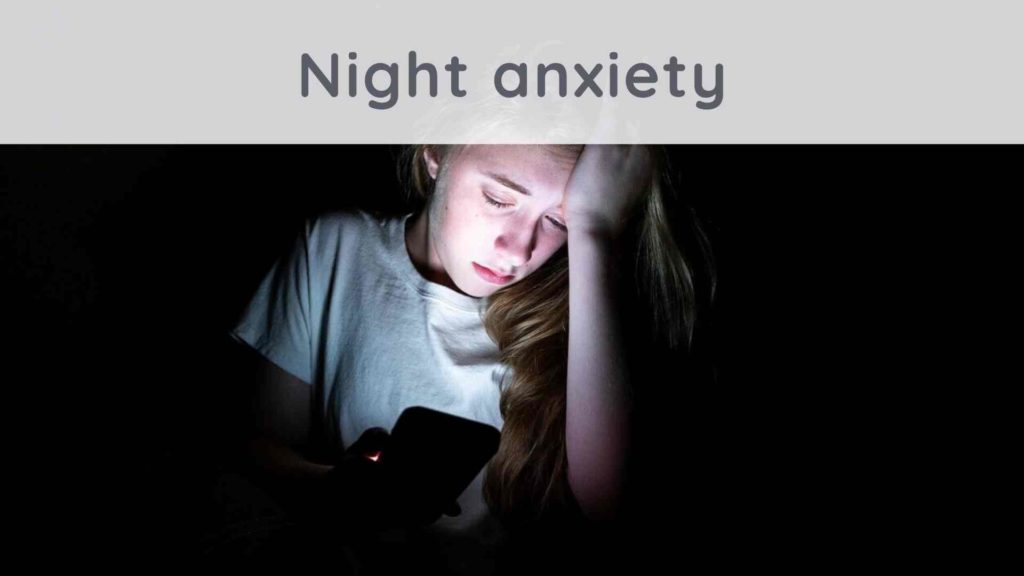Night anxiety: how to calm stress at night?
Written by: Loris Vitry (holistic coach)
Validated by: Cathy Maillot (Osteopath)
Caution: If you have any medical questions or concerns, please speak to your doctor. Even if the articles on this site are based on scientific studies, they do not replace professional medical advice, diagnosis or treatment.

Many people complain that they cannot sleep at night.
This situation generally occurs without warning signs during the day.
It may be due to stress that manifests overnight.
These sleep disruptions can cause severe health problems.
However, some solutions reduce these troubles so that you can sleep in peace.
This article will teach you about the subject and present you with appropriate solutions to deal with night anxiety.
Understanding nocturnal anxiety
Night anxiety is a combination of sleep and anxiety disorders you face at night.
Its period of action is in most cases at night, while the other disorders are felt during the day.
This stress promotes a very short night’s sleep and very frequent awakenings during the night.
It may be due to a financial problem, to a difficulty in the workplace or complicated relationship in your family.
Generally, anxiety happens when you dramatize and rehash a problem all day long.
It can also be a physical problem, such as difficulty in breathing or palpitation.
Because of night anxiety, the quality of your sleep is degraded, and you feel constant tiredness during the daytime.
Moreover, your mood is affected.
It induces the apparition of a vicious circle, which is a cause of insomnia.
The consequences of stress on your sleep
Numerous studies have been carried out concerning nocturnal disturbances, and two very distinct types of stress emerge.
There is positive stress, which manifests as an increase in your energy and a high adrenaline level.
However, this stress may cause a feeling of constant nervousness and lead to insomnia.
In other words, stress causes an increase in your intellectual activity, which in turn prevents you from sleeping.
This rise of activity certainly causes your night awakenings, and re-falling asleep becomes more difficult.
This type of stress is often confused with anxiety.
On the other hand, we have negative stress, which has a direct connection to anxiety.
When you suffer from it, you have trouble sleeping because you rehash your various problems.
Indeed, the results of an Italian study show that negative stress is favorable for the overproduction of cortisol, the stress hormone.
It is produced by the adrenal gland and plays a regulatory role in the cardiovascular system, biosynthesis, and the immune system.
When the body is exposed to it, for a certain amount of time, a fight reaction is triggered.
If the stress is continuous, meaning exposure to stress hormone last too long, you increase the risk of health problems.
It can result in weight gain, heart disease, or depression at any age.
Finding a quick and efficient solution, therefore, becomes a top priority.
Opt for solutions adapted to the care of nocturnal anxiety
The night is the time to recover after a long day at work, so not letting problems take over is vital.
You should know that nighttime thinking will not allow you to find solutions to your daily problems.
To ensure restful sleep, you should eat a light meal before going to bed.
The less the body has to digest at night, the best the sleep.
Before going to bed, write on a sheet of paper, the problems and anxieties that you encounter during the day, and the solutions that you think you have found.
When you are still anxious during the night, it is advisable to take a large glass of water, which will help you fall asleep.
Do deep breathing exercises before going to bed to help you relax.
Also, to fight against sleep disorders, you can opt for homeopathy.
Aside from the various conventional methods that are used to allow you to fall asleep deeply, homeopathy can also help you find relief.
This solution helps you fight anxiety and is useful to reduce nervosity.
It is possible to overcome anxiety and nervousness by choosing therapies designed by professionals.
It can be a therapy that relates to behavior or teaching you techniques that allow you to relax.
Sophrology techniques have also been shown to be effective against sleep disturbances.
To combat anxiety, you can try to gain control through Yoga and meditation.
There are also a few things you should avoid during insomnia.
When you can’t sleep, it’s better to go for a book than to look at the screens.
The screen lights are not favorable for your sleep and the proper functioning of your biological clock.
If, despite these different solutions, you still cannot sleep, then the best would be to refer to a professional like a psychotherapist.
In conclusion, the stresses and difficulties of everyday life are manifested at night in the form of insomnia.
Ultimately, nocturnal anxiety is evil with harsh consequences, and you should look for solutions as soon as possible.
Thanks to the recommendations above, you can fight against nocturnal anxiety to regain sleep that genuinely plays a healthy role.
Continue reading:
Sleep apnea: how to breathe well at night?

